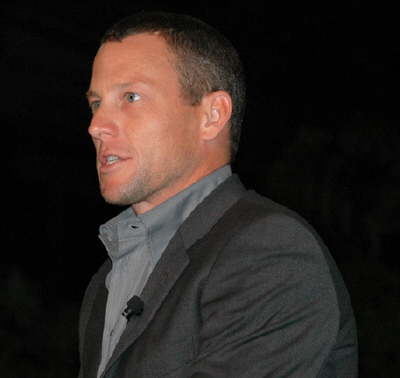Lance Armstrong leads off AMD's Global Vision Conference

This week I am attending AMD’s Global Vision Conference at the posh Ritz-Carlton in Pasadena, near Los Angeles. The agenda is focused on innovations and global impacts, and features a diversity of speakers, including DNA co-discoverer James Watson, Dreamworks’ mogul Jeffrey Katzenberg, Wal-Mart CMO John Fleming, Sun chief scientist John Gage, Lenovo Chairman Yang Yuanqing, virtual reality pioneer Jaron Lanier, Google research director Peter Norvig, VMware co-founder Mendel Rosenbaum, Red Hat CEO Matthew Szulik, futurist Paul Saffo. and of course, AMD Chairman and CEO Hector Ruiz. That’s just a sample.
The conference opened with Lance Armstrong, who’s cycling and cancer foundation work have been supported by AMD. It was Armstrong’s 35th birthday and two weeks away from the 10th anniversary of his diagnosis of testicular cancer. He noted that the National Cancer Institute’s budget has been cut for the first time in 35 years, despite the fact the 600,000 people are year in the U.S. lose their lives to cancer. “We spent in seven months in Iraq what was spent on cancer research in last 35 years,” Armstrong said. One-third of those lives could have been saved if there were access to care and information.

“We know what to do but we don’t do it. While 80 percent of cancer patients do research, only 4 percent have access to information in their place of treatment,” Armstrong said. “We want every treatment center to have a broadband connection to the Internet.” He noted that empowering patients with information may not be what doctors want, given how a patient armed with information could require much more engagement from the medical establishment. Electronic patient records is another area that needs investment, Armstrong said, pointed to all the records that are now underwater post-Katrina.
One way in which Armstrong hopes to have an impact in fighting cancer is through political action, starting with those who wear the now famous yellow wristbands. So far, 61 million “Live Strong” wrist bands have been distributed. At the outset, Armstrong and Nike Chairman Phil Knight, the source of the yellow bands, didn’t think that the item would have any impact. “We want to take the audience of 60 million people and capture 5 to 10 percent who say that [fighting cancer] is their fight. My dream is to put together 3 or 4 million people--today we have 2 million people.” And, those 2 million can be reached and galvanized instantly via the Internet. “With the 2008 election we will ask a lot of questions, and I look forward to effecting change on a global level. I think we can chip away and let the people of America know it is a priority for me,” he said.
During a Q&A at the end of his remarks, Armstrong was asked about performance enhancement supplements. “The idea of performance enhancing is a tricky term,” Armstrong said. “Vitamin C, a great team, a nap, altitude sleeping are performance enhancing. There are deadly dangerous drugs we should be rid of.” Monitoring athletes 24x7 is the only way to deal with the problem, he added. “No drug can clear the body in 24 hours. If an athlete declares where they are, that is the way to police them.”
Armstrong was not complimentary of Dick Pound, chairman of the World Anti-Doping Agency. Recently Pound claimed that disclosures of positive tests for banned substances by former teammates of Armstrong hurt the seven-time Tour de France champion’s reputation.
In a recent New York Times story, Armstrong stated, "Some of us are born with 4 cylinders, and some of us are born with 12.” He obviously believes has the 12 cylinders and said that his battle with cancer made him mentally tougher, while competitors resorted to doping to get an edge. Whatever the case, Armstrong has a new mission that is more far important than any of his cycling career or any controversies surrrounding it: "[Fighting cancer] is the only thing bigger than seven Tour de France victories."